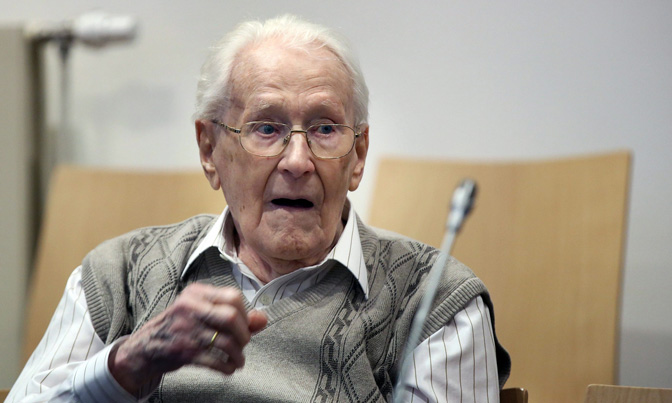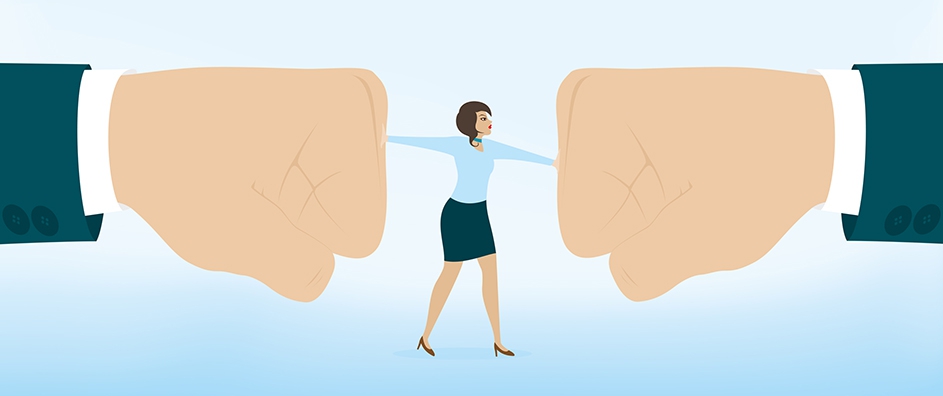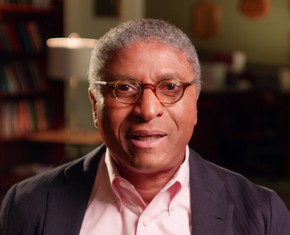The views expressed in our content reflect individual perspectives and do not represent the authoritative views of the Baha'i Faith.
A long time ago, when the “good guys” and the “bad guys” seemed so clearly identifiable, many people took comfort in that simple formula.

Oskar Gröning, 94 year old who served as accountant for Auschwitz stands trial
I have wondered if this old idea supplies the driving force behind the recent trial of a 94-year-old Nazi accountant who worked at Auschwitz. His job: to tally the wealth taken from those imprisoned and executed there. He had an important position, because the economic incentive for the Holocaust, the occupation of territories, and slave labor—all focused on the accumulation and seizure of wealth—provided much of the fuel for Hitler’s pursuit of a German Empire.
Although just a cog in the Nazi machine, after World War II, the accountant did not face criminal charges. The governments of the world recognized the impossibility of prosecuting all the “cogs” that made the Nazi regime so murderously efficient. But because he was legally unfortunate enough to live so long, this “bad guy” was recently tried as an accessory to murder.
It’s almost impossible to understand how someone could go to work every morning at Auschwitz, but he did. His function was purely clerical, and he does admit to a moral guilt as a passive participant. However, an important question emerges from all this. Where does a human mind travel as a passive participant surrounded by horror? A distortion of reality makes this possible—and that really only requires turning a blind eye. Maybe, as for him, many people find it easier to do than any of us would like to admit.
Seventy years later, it bears asking where humanity stands as far as the spiritual guidance given over 2000 years ago in Galatians 6:2, “Bear one another’s burdens and so fulfill the law of Christ”.
Right now, for example, we live in a world of “throw away” clothing, so inexpensive it literally becomes disposable after a few uses. This can only happen because the labor costs to make such clothing can be kept at a minimum by using child and destitute workers.
Just recently, an investigative reporter revealed that the Thai fishing industry has provided fish to western supermarkets utilizing slave labor from Thailand, Burma, Cambodia and Laos. The non-compliant slaves were beaten, shocked, starved and thrown overboard. Many died. Men are now returning home to their families after enslavement for more than 20 years.
The list of examples could be endless, but these two both illustrate the unhappy common thread that brings us from Nazi Germany to today: the economic perks on a personal, business and national level that come from the exploitation, repression and murder of other human beings. To address it will require, then as now, attentive minds that take us beyond passive participation.
Abdu’l-Baha, in 1912, clarified what this means:
Assist the world of humanity as much as possible. Be the source of consolation to every sad one, assist every weak one, be helpful to every indigent one, care for every sick one, be the cause of glorification to every lowly one, and shelter those who are overshadowed by fear. – Abdu’l-Baha, The Promulgation of Universal Peace, p. 453.
In brief, all humanity must be looked upon with love, kindness and respect; for what we behold in them are none other than the signs and traces of God Himself. All are evidences of God; therefore, how shall we be justified in debasing and belittling them, uttering anathema and preventing them from drawing near unto His mercy? This is ignorance and injustice, displeasing to God; for in His sight all are His servants. – Ibid., p. 231.
The Nazi accountant was found guilty of 300,000 counts of accessory to murder and sentenced to four years in prison. The rationale for the sentence involved his complicity in those deaths by doing a job that monetarily assisted the Nazi Regime to carry out their atrocities. If this logic is true for him, it must also be true for all of us. Are we monetarily assisting atrocities?
Auschwitz does not have to be a place—it can also be a state of mind. It can exist because our materialistic world’s wealth often proceeds from the suffering of others. When human beings are treated as a resource whose labor is mined only for the benefit of others, without consideration for their welfare, this represents another holocaust, spreading across the world even though better hidden from sight.
In our quest for more and cheaper, as we turn blind eyes, distort sad realities and pay no attention to what our money supports, have we reached a moral equivalency to this prison camp accountant? It seemed easier in the old days, at least in our minds, to sort the “good guys” from the “bad guys.” However, as we grow more spiritually capable and more aware, perhaps the free passes are not so free anymore.
















Comments
Sign in or create an account
Continue with Googleor